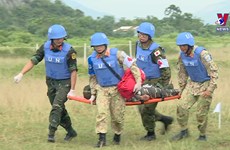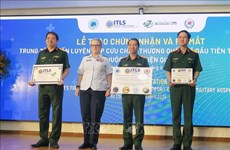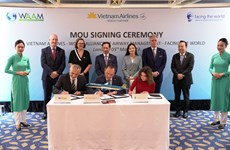Expanded Immunisation Programme contributes to children health care
The Expanded Immunisation Programme in Vietnam, which was launched in
1985, has helped prevent between 2-3 million deaths each year from
dangerous communicable diseases, said the programme’s Director Prof. Dr
Nguyen Tran Hien.
The Expanded Immunisation Programme in Vietnam, which was launched in
1985, has helped prevent between 2-3 million deaths each year from
dangerous communicable diseases, said the programme’s Director Prof. Dr
Nguyen Tran Hien.
He said hundreds of millions of children across the country have received free vaccines against tuberculosis, poliomyelitis, diphtheria, pertussis, tetanus, measles, Japanese encephalitis and hepatitis B through large-scale national vaccine programmes over the past 30 years.
Last year, Vietnam had remained poliomyelitis- and tetanus-free for 14 and 9 years, respectively, despite the continued threat of wild poliovirus import from other places in South Asia and Africa, such as Pakistan , Afghanistan , Somalia , Nigeria .
Prof. Dr Nguyen Tran Hien reported that around 50 million vaccination doses were administered safely last year under the free immunisation programmes at more than 11,100 communes and wards nationwide. At the same time, Vietnam has been able to produce 10 out of 12 types of vaccines used for the programme.
WHO experts recently announced that the Vietnamese vaccine safety surveillance programme meets WHO requirements, evidence of the quality of domestic vaccines and creating opportunities for export, he affirmed.
Professor Dr Dang Duc Anh, Director of the National Institute of Hygiene and Epidemiology under the Ministry of Health under the Ministry of Health (MoH) affirmed that vaccines are safe and effective in protecting infants and children from vaccine-preventable diseases.
According to the Institute, the global goals to eliminate infectious diseases include eliminating poliomyelitis by 2018, measles by 2020 and bringing the hepatitis B-infection rate in under-five children to below one percent in the West Pacific Ocean Region by 2017.
Meanwhile, Director of the Ministry’s Department of Preventive Medicine Tran Dac Phu said the expanded immunisation programme is facing some major challenges, including the high risk of diseases entering Vietnam, a shortage of budget and service quality in remote areas.-VNA
He said hundreds of millions of children across the country have received free vaccines against tuberculosis, poliomyelitis, diphtheria, pertussis, tetanus, measles, Japanese encephalitis and hepatitis B through large-scale national vaccine programmes over the past 30 years.
Last year, Vietnam had remained poliomyelitis- and tetanus-free for 14 and 9 years, respectively, despite the continued threat of wild poliovirus import from other places in South Asia and Africa, such as Pakistan , Afghanistan , Somalia , Nigeria .
Prof. Dr Nguyen Tran Hien reported that around 50 million vaccination doses were administered safely last year under the free immunisation programmes at more than 11,100 communes and wards nationwide. At the same time, Vietnam has been able to produce 10 out of 12 types of vaccines used for the programme.
WHO experts recently announced that the Vietnamese vaccine safety surveillance programme meets WHO requirements, evidence of the quality of domestic vaccines and creating opportunities for export, he affirmed.
Professor Dr Dang Duc Anh, Director of the National Institute of Hygiene and Epidemiology under the Ministry of Health under the Ministry of Health (MoH) affirmed that vaccines are safe and effective in protecting infants and children from vaccine-preventable diseases.
According to the Institute, the global goals to eliminate infectious diseases include eliminating poliomyelitis by 2018, measles by 2020 and bringing the hepatitis B-infection rate in under-five children to below one percent in the West Pacific Ocean Region by 2017.
Meanwhile, Director of the Ministry’s Department of Preventive Medicine Tran Dac Phu said the expanded immunisation programme is facing some major challenges, including the high risk of diseases entering Vietnam, a shortage of budget and service quality in remote areas.-VNA













